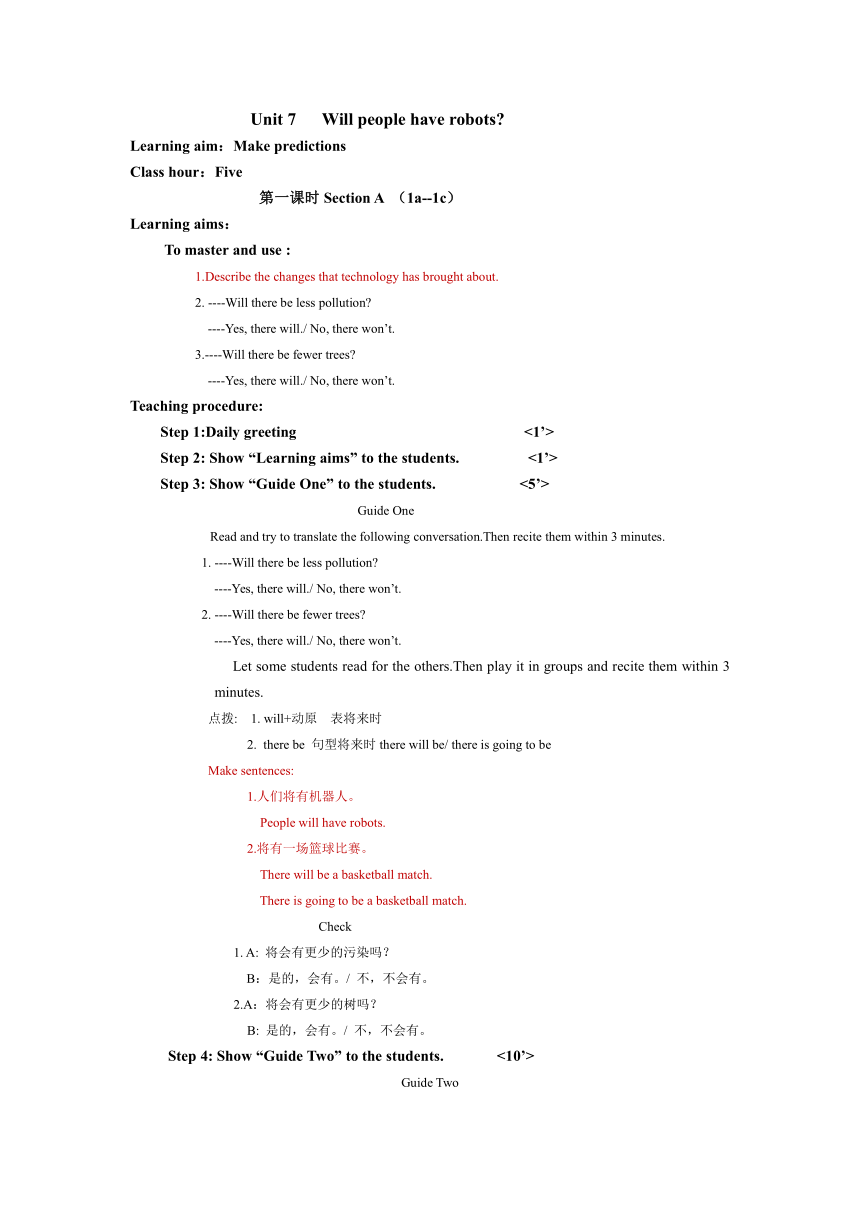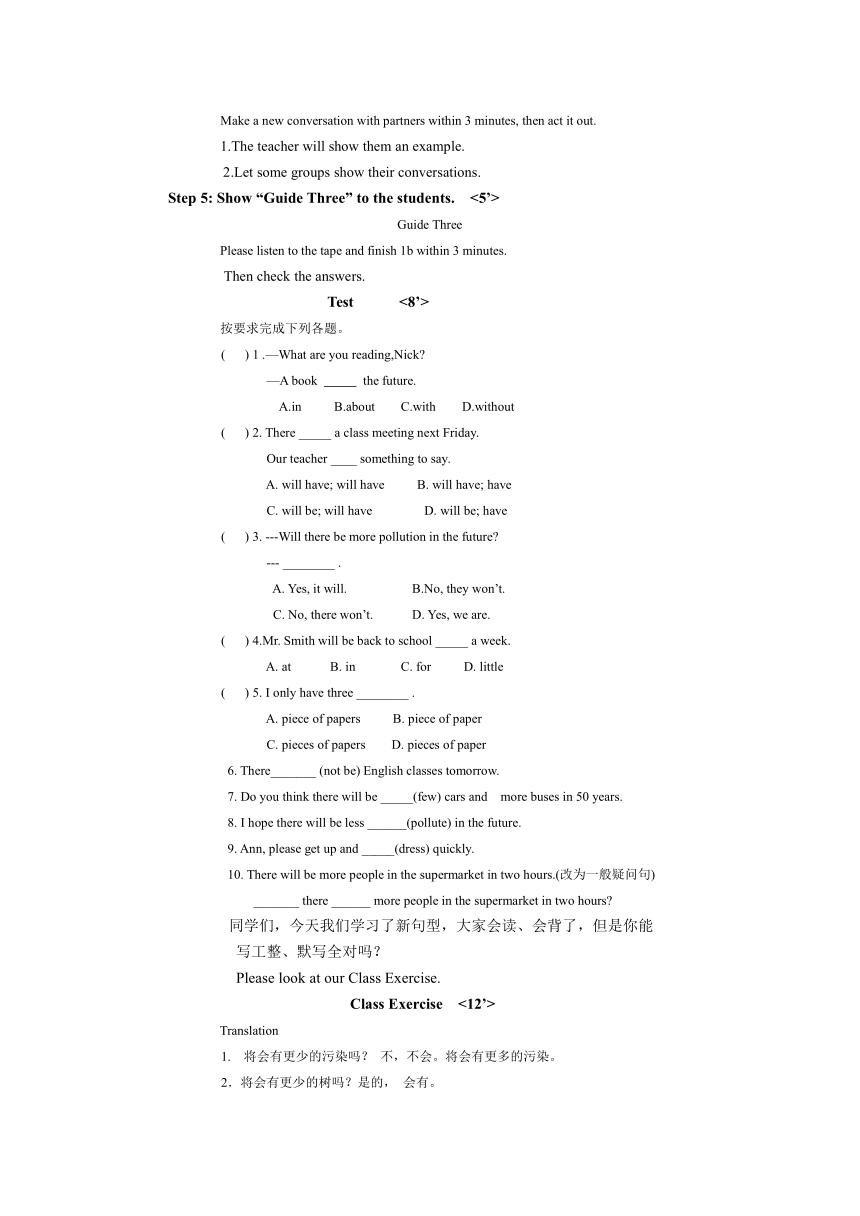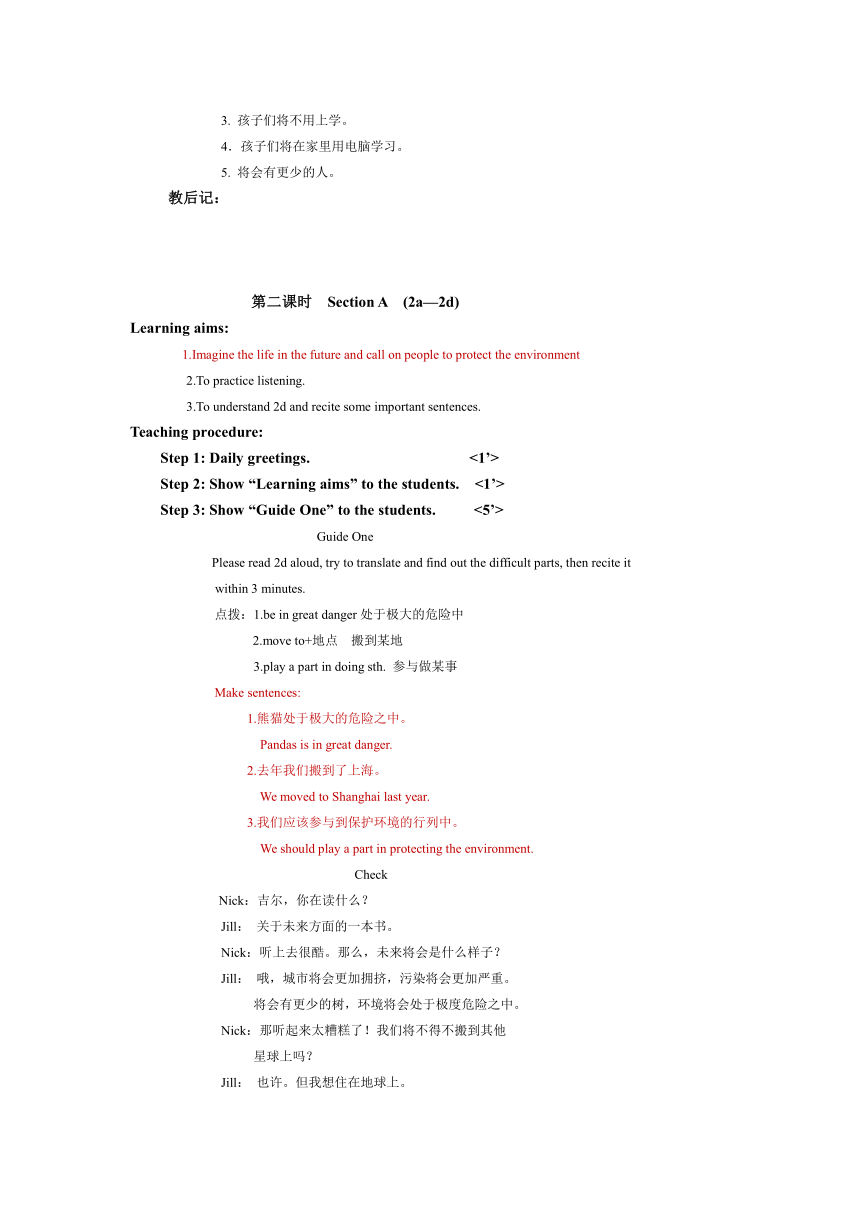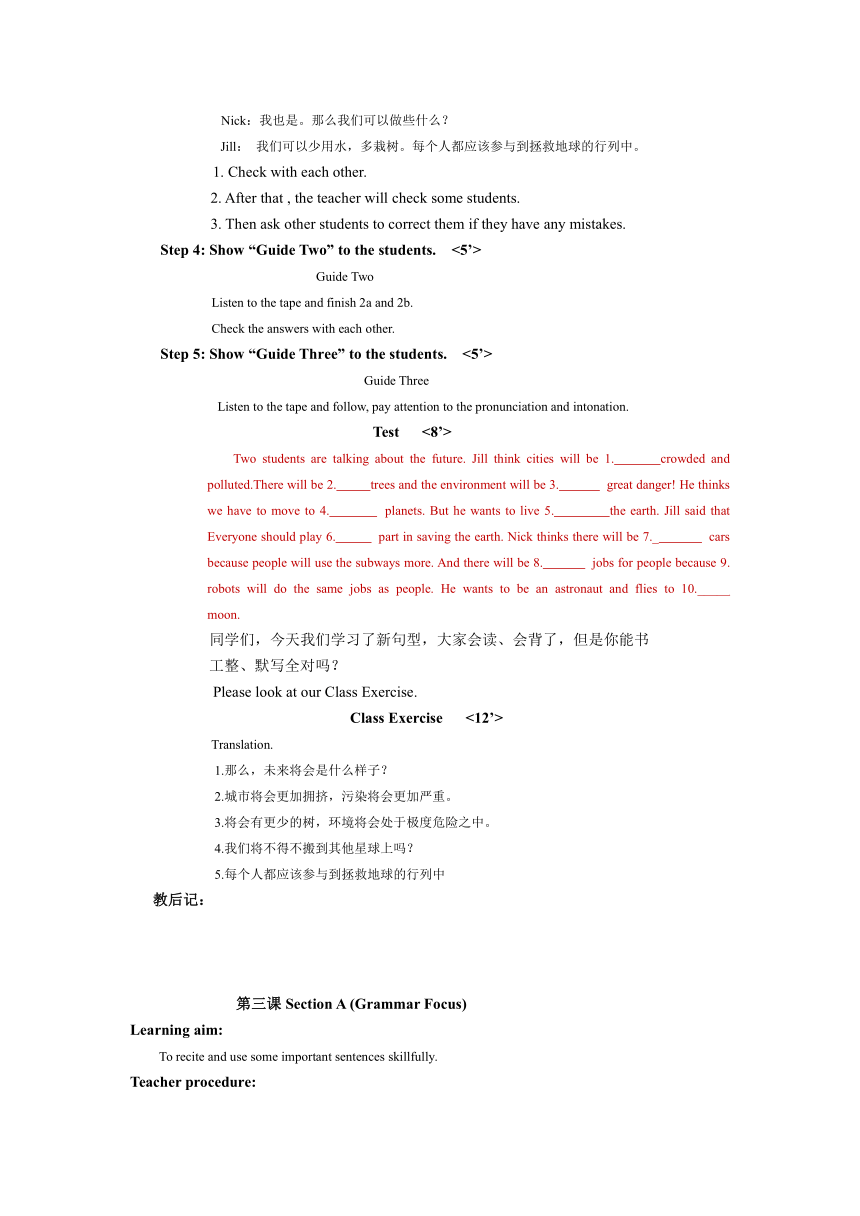2021-2022人教版八年级上册Unit 7 Will people have robots?学案(5课时)
文档属性
| 名称 | 2021-2022人教版八年级上册Unit 7 Will people have robots?学案(5课时) |  | |
| 格式 | docx | ||
| 文件大小 | 26.4KB | ||
| 资源类型 | 教案 | ||
| 版本资源 | 人教新目标(Go for it)版 | ||
| 科目 | 英语 | ||
| 更新时间 | 2021-10-04 17:08:47 | ||
图片预览




文档简介
Unit
7
Will
people
have
robots
Learning
aim:Make
predictions
Class
hour:Five
第一课时Section
A
(1a--1c)
Learning
aims:
To
master
and
use
:
1.Describe
the
changes
that
technology
has
brought
about.
2.
----Will
there
be
less
pollution
----Yes,
there
will./
No,
there
won’t.
3.----Will
there
be
fewer
trees
----Yes,
there
will./
No,
there
won’t.
Teaching
procedure:
Step
1:Daily
greeting
<1’>
Step
2:
Show
“Learning
aims”
to
the
students.
<1’>
Step
3:
Show
“Guide
One”
to
the
students.
<5’>
Guide
One
Read
and
try
to
translate
the
following
conversation.Then
recite
them
within
3
minutes.
1.
----Will
there
be
less
pollution
----Yes,
there
will./
No,
there
won’t.
2.
----Will
there
be
fewer
trees
----Yes,
there
will./
No,
there
won’t.
Let
some
students
read
for
the
others.Then
play
it
in
groups
and
recite
them
within
3
minutes.
点拨:
1.
will+动原
表将来时
there
be
句型将来时there
will
be/
there
is
going
to
be
Make
sentences:
1.人们将有机器人。
People
will
have
robots.
2.将有一场篮球比赛。
There
will
be
a
basketball
match.
There
is
going
to
be
a
basketball
match.
Check
1.
A:
将会有更少的污染吗?
B:是的,会有。/
不,不会有。
2.A:将会有更少的树吗?
B:
是的,会有。/
不,不会有。
Step
4:
Show
“Guide
Two”
to
the
students.
<10’>
Guide
Two
Make
a
new
conversation
with
partners
within
3
minutes,
then
act
it
out.
1.The
teacher
will
show
them
an
example.
2.Let
some
groups
show
their
conversations.
Step
5:
Show
“Guide
Three”
to
the
students.
<5’>
Guide
Three
Please
listen
to
the
tape
and
finish
1b
within
3
minutes.
Then
check
the
answers.
Test
<8’>
按要求完成下列各题。
(
)
1
.—What
are
you
reading,Nick
—A
book
the
future.
A.in
B.about
C.with
D.without
(
)
2.
There
_____
a
class
meeting
next
Friday.
Our
teacher
____
something
to
say.
A.
will
have;
will
have
B.
will
have;
have
C.
will
be;
will
have
D.
will
be;
have
(
)
3.
---Will
there
be
more
pollution
in
the
future
---
________
.
A.
Yes,
it
will.
B.No,
they
won’t.
C.
No,
there
won’t.
D.
Yes,
we
are.
(
)
4.Mr.
Smith
will
be
back
to
school
_____
a
week.
A.
at
B.
in
C.
for
D.
little
(
)
5.
I
only
have
three
________
.
A.
piece
of
papers
B.
piece
of
paper
C.
pieces
of
papers
D.
pieces
of
paper
6.
There_______
(not
be)
English
classes
tomorrow.
7.
Do
you
think
there
will
be
_____(few)
cars
and
more
buses
in
50
years.
8.
I
hope
there
will
be
less
______(pollute)
in
the
future.
9.
Ann,
please
get
up
and
_____(dress)
quickly.
10.
There
will
be
more
people
in
the
supermarket
in
two
hours.(改为一般疑问句)
_______
there
______
more
people
in
the
supermarket
in
two
hours
同学们,今天我们学习了新句型,大家会读、会背了,但是你能
写工整、默写全对吗?
Please
look
at
our
Class
Exercise.
Class
Exercise
<12’>
Translation
将会有更少的污染吗?
不,不会。将会有更多的污染。
2.将会有更少的树吗?是的,
会有。
3.
孩子们将不用上学。
4.孩子们将在家里用电脑学习。
5.
将会有更少的人。
教后记:
第二课时
Section
A
(2a—2d)
Learning
aims:
1.Imagine
the
life
in
the
future
and
call
on
people
to
protect
the
environment
2.To
practice
listening.
3.To
understand
2d
and
recite
some
important
sentences.
Teaching
procedure:
Step
1:
Daily
greetings.
<1’>
Step
2:
Show
“Learning
aims”
to
the
students.
<1’>
Step
3:
Show
“Guide
One”
to
the
students.
<5’>
Guide
One
Please
read
2d
aloud,
try
to
translate
and
find
out
the
difficult
parts,
then
recite
it
within
3
minutes.
点拨:1.be
in
great
danger处于极大的危险中
2.move
to+地点
搬到某地
3.play
a
part
in
doing
sth.
参与做某事
Make
sentences:
1.熊猫处于极大的危险之中。
Pandas
is
in
great
danger.
2.去年我们搬到了上海。
We
moved
to
Shanghai
last
year.
3.我们应该参与到保护环境的行列中。
We
should
play
a
part
in
protecting
the
environment.
Check
Nick:吉尔,你在读什么?
Jill:
关于未来方面的一本书。
Nick:听上去很酷。那么,未来将会是什么样子?
Jill:
哦,城市将会更加拥挤,污染将会更加严重。
将会有更少的树,环境将会处于极度危险之中。
Nick:那听起来太糟糕了!我们将不得不搬到其他
星球上吗?
Jill:
也许。但我想住在地球上。
Nick:我也是。那么我们可以做些什么?
Jill:
我们可以少用水,多栽树。每个人都应该参与到拯救地球的行列中。
1.
Check
with
each
other.
2.
After
that
,
the
teacher
will
check
some
students.
3.
Then
ask
other
students
to
correct
them
if
they
have
any
mistakes.
Step
4:
Show
“Guide
Two”
to
the
students.
<5’>
Guide
Two
Listen
to
the
tape
and
finish
2a
and
2b.
Check
the
answers
with
each
other.
Step
5:
Show
“Guide
Three”
to
the
students.
<5’>
Guide
Three
Listen
to
the
tape
and
follow,
pay
attention
to
the
pronunciation
and
intonation.
Test
<8’>
Two
students
are
talking
about
the
future.
Jill
think
cities
will
be
1.
crowded
and
polluted.There
will
be
2.
trees
and
the
environment
will
be
3.
great
danger!
He
thinks
we
have
to
move
to
4.
planets.
But
he
wants
to
live
5.
the
earth.
Jill
said
that
Everyone
should
play
6.
part
in
saving
the
earth.
Nick
thinks
there
will
be
7._
cars
because
people
will
use
the
subways
more.
And
there
will
be
8.
jobs
for
people
because
9.
robots
will
do
the
same
jobs
as
people.
He
wants
to
be
an
astronaut
and
flies
to
10._____
moon.
同学们,今天我们学习了新句型,大家会读、会背了,但是你能书
工整、默写全对吗?
Please
look
at
our
Class
Exercise.
Class
Exercise
<12’>
Translation.
1.那么,未来将会是什么样子?
2.城市将会更加拥挤,污染将会更加严重。
3.将会有更少的树,环境将会处于极度危险之中。
4.我们将不得不搬到其他星球上吗?
5.每个人都应该参与到拯救地球的行列中
教后记:
第三课Section
A
(Grammar
Focus)
Learning
aim:
To
recite
and
use
some
important
sentences
skillfully.
Teacher
procedure:
Step
1:
Daily
greetings.
<1’>
Step
2:
Show
“Guide
One”
to
the
students.
<1’>
Guide
One
Please
read
and
try
to
translate
the
Grammar
Focus,
then
recite
it
within
4
minutes.
Check
1.未来将会是什么样子?
2.
城市将会有更多的污染。并且将会有更少的树。
3.
100年以后人们还会使用钱吗?
4.
不,他们不会了。一切都将是免费的。
5.
世界将会和平吗?是的,我希望如此。
6.
孩子们将在家里通过电脑学习。
7.
他们将不用去上学。
8.
将会有更多的人。
9.
将会有更少的树。
10.
将会有更少的空闲时间。
Step
3:
Show
“Guide
Two”
to
the
students.
<5’>
Guide
Two
Please
look
at
3a
and
finish
it
within
4
minutes.
Check
the
answers.
Test
<8’>
(
)1.
What
will
the
weather
_______
tomorrow
A.
like
B.
be
like
C.
looks
like
D.
look
like
(
)
2.
If
I
have
______
free
time,
I
will
travel
to
Europe.
A.
many
B.
more
C.
fewer
D.
less
(
)
3.
Do
you
think
that
______
more
trees
in
the
future
A.
will
there
be
B.
are
there
C.
there
will
have
D.
there
will
be
4.There
______(be)
a
football
match
this
Sunday.
5.There
will
be
______
(更少的)pollution
in
the
future.
6.
There
will
be
______(更少的)
schools.
7.
We
sometimes
see
blue
______
(sky)
in
our
city.
8.
There
will
be
more
people
.
(改为否定句)
There
_______
_______
more
people.
9.未来将会是什么样子?
What
_______
the
future
______
______
10.
She
will
go
climbing
with
me
next
week.(改为否定句)
She
_______
_______go
climbing
with
me
next
week.
同学们,今天我们学习了新句型,大家会读、会背
了,但是你能书写工整、默写全对吗?
Please
look
at
our
Class
Exercise.
Class
Exercise
<12’>
Translation.
1.
未来将会是什么样子?
2.
城市将会有更多的污染。
3.
100年以后人们还会使用钱吗?不,不会了。
4.
世界将会和平吗?是的,我希望如此。
5.
孩子们将在家里通过电脑学习。
6.
将会有更少的空闲时间。
教后记:
第四课时
Section
B
(1a—1e)
Learning
aims:
1.
To
practice
the
listening.
2.
To
recite
some
important
sentences
skillfully.
Step
1:
Daily
greetings.
<1’>
Step
2:
Show
“Learning
aims”
to
the
students.
<1’>
Step
3:
Show
“Guide
One”
to
the
students.
<5’>
Guide
One
Look
at
1a
and
fill
in
the
blanks.
Then
check
the
answers.
Step
4:
Show
“Guide
Two”
to
the
students.
<5’>
Guide
Two
Listen
to
the
tape
and
finish
1c
and
1d.
Then
check
the
answers.
Step
5:
Show
“Guide
Three”
to
the
student.
<5’>
Guide
Three
Listen
to
the
tape
and
finish
1d.
Then
check
the
answers.
Test
<8’>
Ten
years
ago,
Joe
lived
1.
____
his
parents
in
Highville
.
He
2
___
to
school
3____
train
.
Now
Joe
lives
in
4.
____
apartment
across
the
street
5
______
here
in
Highville.
He
is
6
_____
computer
programmer.
He
wants
to
be
8.
_____
astronaut
.
He
wants
to
fly
9
______
to
the
moon
.
He
wants
live
10
____
a
space
station.
同学们,今天我们学习了新句型,大家会读、会背了,但是你能书写工整、默写全对吗?
Please
look
at
our
Class
Exercise.
Class
Exercise
<12’>
1.
我住在公寓里。
2.
两年前我做火车上学。
3.
我是一个电脑程序设计师。
4.
我将成为一名宇航员。
5.
我将乘坐火箭飞向月球。
教后记:
第五课时
Section
B
(2b)
Learning
aims:
1.Robots
can
do
many
things
and
people
will
have
a
robot
in
the
future.
2.To
learn
and
understand
2b.
3.To
recite
some
important
sentences.
Step
1:
Daily
greetings.
<1’>
Step
2:
Show
“
learning
aims
’’to
the
students.
<2’>
Step
3:
Show
“Guide
One”
to
the
students.
<5’>
Guide
One
Please
read
2b
aloud
and
finish
2b.
Then
check
the
answers.
Step
4:
Show
“Guide
Two”
to
the
students.
<8’>
Read
2b
again
quickly
and
finish
2c.
Then
check
the
answers.
Step
5:
Show
“Guide
Three”
to
the
students.
<
6’>
Read
2b
again
and
find
out
difficult
points.
Discuss
in
groups.
点拨:1.in
the
future
在将来
in
future
从今往后
2.in+
一段时间
3.get
bored
(get+形容词)
4.hundreds
of+可数名词复数
5.the
same
as
Make
sentences:
1.我将在两天之后读完这本书。
I
will
read
the
book
in
two
days.
2.机器人将从来不会感到无聊。
Robots
will
never
get
bored.
3.我有数百本书。
I
have
hundreds
of
books.
4.你的帽子和我的一样。
Your
hat
is
the
same
as
mine.
Step
6:
Show
“Guide
Four”
to
the
students.
<5’>
Guide
Four
Please
finish
2d
within
4
minutes.
Check
the
answers.
Test
<8’>
When
we
watch
movies
1.
the
future,we
sometimes
see
robots.
They
are
usually
like
human
servants.
They
help
2.
the
housework
and
do
jobs
3.
working
in
dirty
or
dangerous
places.
Today
there
are
already
robots
working
in
factories.
Some
can
help
4.
build
cars,
and
they
do
simple
jobs
over
and
over
again.
Fewer
people
will
do
such
jobs
in
the
future
because
they
are
boring,
5.
robots
will
never
get
bored.
Scientists
are
now
trying
to
make
robots
look
6.
and
do
the
same
things
7.
we
do.
Some
robots
in
Japan
can
walk
and
dance.
They
are
fun
8.
watch.
However,
some
scientists
believe
that
although
we
can
make
robots
move
9.
people,
it
will
be
difficult
to
make
them
really
think
like
a
human.
For
example,
scientist
James
White
thinks
that
robots
will
never
be
able
to
wake
up
and
know
where
they
are.
But
many
scientists
disagree
10.
Mr.
White.
They
think
that
robots
will
even
be
able
to
talk
like
humans
in
25
to
50
years.
同学们,今天我们学习了新句型,大家会读、会背了,但是你能书写工整、默写全对吗?
Please
look
at
our
Class
Exercise.
Class
Exercise
<
12’>
1.
今天已经有机器人在工厂工作了。
2.
日本的一些机器人能走路和跳舞。
3.
一些科学家认为在将来将有更多,机器人。
4.
这些新的机器人将有许多不同的形状。
5.
我们永远不知道将来会发生什么事情。
教后记:
7
Will
people
have
robots
Learning
aim:Make
predictions
Class
hour:Five
第一课时Section
A
(1a--1c)
Learning
aims:
To
master
and
use
:
1.Describe
the
changes
that
technology
has
brought
about.
2.
----Will
there
be
less
pollution
----Yes,
there
will./
No,
there
won’t.
3.----Will
there
be
fewer
trees
----Yes,
there
will./
No,
there
won’t.
Teaching
procedure:
Step
1:Daily
greeting
<1’>
Step
2:
Show
“Learning
aims”
to
the
students.
<1’>
Step
3:
Show
“Guide
One”
to
the
students.
<5’>
Guide
One
Read
and
try
to
translate
the
following
conversation.Then
recite
them
within
3
minutes.
1.
----Will
there
be
less
pollution
----Yes,
there
will./
No,
there
won’t.
2.
----Will
there
be
fewer
trees
----Yes,
there
will./
No,
there
won’t.
Let
some
students
read
for
the
others.Then
play
it
in
groups
and
recite
them
within
3
minutes.
点拨:
1.
will+动原
表将来时
there
be
句型将来时there
will
be/
there
is
going
to
be
Make
sentences:
1.人们将有机器人。
People
will
have
robots.
2.将有一场篮球比赛。
There
will
be
a
basketball
match.
There
is
going
to
be
a
basketball
match.
Check
1.
A:
将会有更少的污染吗?
B:是的,会有。/
不,不会有。
2.A:将会有更少的树吗?
B:
是的,会有。/
不,不会有。
Step
4:
Show
“Guide
Two”
to
the
students.
<10’>
Guide
Two
Make
a
new
conversation
with
partners
within
3
minutes,
then
act
it
out.
1.The
teacher
will
show
them
an
example.
2.Let
some
groups
show
their
conversations.
Step
5:
Show
“Guide
Three”
to
the
students.
<5’>
Guide
Three
Please
listen
to
the
tape
and
finish
1b
within
3
minutes.
Then
check
the
answers.
Test
<8’>
按要求完成下列各题。
(
)
1
.—What
are
you
reading,Nick
—A
book
the
future.
A.in
B.about
C.with
D.without
(
)
2.
There
_____
a
class
meeting
next
Friday.
Our
teacher
____
something
to
say.
A.
will
have;
will
have
B.
will
have;
have
C.
will
be;
will
have
D.
will
be;
have
(
)
3.
---Will
there
be
more
pollution
in
the
future
---
________
.
A.
Yes,
it
will.
B.No,
they
won’t.
C.
No,
there
won’t.
D.
Yes,
we
are.
(
)
4.Mr.
Smith
will
be
back
to
school
_____
a
week.
A.
at
B.
in
C.
for
D.
little
(
)
5.
I
only
have
three
________
.
A.
piece
of
papers
B.
piece
of
paper
C.
pieces
of
papers
D.
pieces
of
paper
6.
There_______
(not
be)
English
classes
tomorrow.
7.
Do
you
think
there
will
be
_____(few)
cars
and
more
buses
in
50
years.
8.
I
hope
there
will
be
less
______(pollute)
in
the
future.
9.
Ann,
please
get
up
and
_____(dress)
quickly.
10.
There
will
be
more
people
in
the
supermarket
in
two
hours.(改为一般疑问句)
_______
there
______
more
people
in
the
supermarket
in
two
hours
同学们,今天我们学习了新句型,大家会读、会背了,但是你能
写工整、默写全对吗?
Please
look
at
our
Class
Exercise.
Class
Exercise
<12’>
Translation
将会有更少的污染吗?
不,不会。将会有更多的污染。
2.将会有更少的树吗?是的,
会有。
3.
孩子们将不用上学。
4.孩子们将在家里用电脑学习。
5.
将会有更少的人。
教后记:
第二课时
Section
A
(2a—2d)
Learning
aims:
1.Imagine
the
life
in
the
future
and
call
on
people
to
protect
the
environment
2.To
practice
listening.
3.To
understand
2d
and
recite
some
important
sentences.
Teaching
procedure:
Step
1:
Daily
greetings.
<1’>
Step
2:
Show
“Learning
aims”
to
the
students.
<1’>
Step
3:
Show
“Guide
One”
to
the
students.
<5’>
Guide
One
Please
read
2d
aloud,
try
to
translate
and
find
out
the
difficult
parts,
then
recite
it
within
3
minutes.
点拨:1.be
in
great
danger处于极大的危险中
2.move
to+地点
搬到某地
3.play
a
part
in
doing
sth.
参与做某事
Make
sentences:
1.熊猫处于极大的危险之中。
Pandas
is
in
great
danger.
2.去年我们搬到了上海。
We
moved
to
Shanghai
last
year.
3.我们应该参与到保护环境的行列中。
We
should
play
a
part
in
protecting
the
environment.
Check
Nick:吉尔,你在读什么?
Jill:
关于未来方面的一本书。
Nick:听上去很酷。那么,未来将会是什么样子?
Jill:
哦,城市将会更加拥挤,污染将会更加严重。
将会有更少的树,环境将会处于极度危险之中。
Nick:那听起来太糟糕了!我们将不得不搬到其他
星球上吗?
Jill:
也许。但我想住在地球上。
Nick:我也是。那么我们可以做些什么?
Jill:
我们可以少用水,多栽树。每个人都应该参与到拯救地球的行列中。
1.
Check
with
each
other.
2.
After
that
,
the
teacher
will
check
some
students.
3.
Then
ask
other
students
to
correct
them
if
they
have
any
mistakes.
Step
4:
Show
“Guide
Two”
to
the
students.
<5’>
Guide
Two
Listen
to
the
tape
and
finish
2a
and
2b.
Check
the
answers
with
each
other.
Step
5:
Show
“Guide
Three”
to
the
students.
<5’>
Guide
Three
Listen
to
the
tape
and
follow,
pay
attention
to
the
pronunciation
and
intonation.
Test
<8’>
Two
students
are
talking
about
the
future.
Jill
think
cities
will
be
1.
crowded
and
polluted.There
will
be
2.
trees
and
the
environment
will
be
3.
great
danger!
He
thinks
we
have
to
move
to
4.
planets.
But
he
wants
to
live
5.
the
earth.
Jill
said
that
Everyone
should
play
6.
part
in
saving
the
earth.
Nick
thinks
there
will
be
7._
cars
because
people
will
use
the
subways
more.
And
there
will
be
8.
jobs
for
people
because
9.
robots
will
do
the
same
jobs
as
people.
He
wants
to
be
an
astronaut
and
flies
to
10._____
moon.
同学们,今天我们学习了新句型,大家会读、会背了,但是你能书
工整、默写全对吗?
Please
look
at
our
Class
Exercise.
Class
Exercise
<12’>
Translation.
1.那么,未来将会是什么样子?
2.城市将会更加拥挤,污染将会更加严重。
3.将会有更少的树,环境将会处于极度危险之中。
4.我们将不得不搬到其他星球上吗?
5.每个人都应该参与到拯救地球的行列中
教后记:
第三课Section
A
(Grammar
Focus)
Learning
aim:
To
recite
and
use
some
important
sentences
skillfully.
Teacher
procedure:
Step
1:
Daily
greetings.
<1’>
Step
2:
Show
“Guide
One”
to
the
students.
<1’>
Guide
One
Please
read
and
try
to
translate
the
Grammar
Focus,
then
recite
it
within
4
minutes.
Check
1.未来将会是什么样子?
2.
城市将会有更多的污染。并且将会有更少的树。
3.
100年以后人们还会使用钱吗?
4.
不,他们不会了。一切都将是免费的。
5.
世界将会和平吗?是的,我希望如此。
6.
孩子们将在家里通过电脑学习。
7.
他们将不用去上学。
8.
将会有更多的人。
9.
将会有更少的树。
10.
将会有更少的空闲时间。
Step
3:
Show
“Guide
Two”
to
the
students.
<5’>
Guide
Two
Please
look
at
3a
and
finish
it
within
4
minutes.
Check
the
answers.
Test
<8’>
(
)1.
What
will
the
weather
_______
tomorrow
A.
like
B.
be
like
C.
looks
like
D.
look
like
(
)
2.
If
I
have
______
free
time,
I
will
travel
to
Europe.
A.
many
B.
more
C.
fewer
D.
less
(
)
3.
Do
you
think
that
______
more
trees
in
the
future
A.
will
there
be
B.
are
there
C.
there
will
have
D.
there
will
be
4.There
______(be)
a
football
match
this
Sunday.
5.There
will
be
______
(更少的)pollution
in
the
future.
6.
There
will
be
______(更少的)
schools.
7.
We
sometimes
see
blue
______
(sky)
in
our
city.
8.
There
will
be
more
people
.
(改为否定句)
There
_______
_______
more
people.
9.未来将会是什么样子?
What
_______
the
future
______
______
10.
She
will
go
climbing
with
me
next
week.(改为否定句)
She
_______
_______go
climbing
with
me
next
week.
同学们,今天我们学习了新句型,大家会读、会背
了,但是你能书写工整、默写全对吗?
Please
look
at
our
Class
Exercise.
Class
Exercise
<12’>
Translation.
1.
未来将会是什么样子?
2.
城市将会有更多的污染。
3.
100年以后人们还会使用钱吗?不,不会了。
4.
世界将会和平吗?是的,我希望如此。
5.
孩子们将在家里通过电脑学习。
6.
将会有更少的空闲时间。
教后记:
第四课时
Section
B
(1a—1e)
Learning
aims:
1.
To
practice
the
listening.
2.
To
recite
some
important
sentences
skillfully.
Step
1:
Daily
greetings.
<1’>
Step
2:
Show
“Learning
aims”
to
the
students.
<1’>
Step
3:
Show
“Guide
One”
to
the
students.
<5’>
Guide
One
Look
at
1a
and
fill
in
the
blanks.
Then
check
the
answers.
Step
4:
Show
“Guide
Two”
to
the
students.
<5’>
Guide
Two
Listen
to
the
tape
and
finish
1c
and
1d.
Then
check
the
answers.
Step
5:
Show
“Guide
Three”
to
the
student.
<5’>
Guide
Three
Listen
to
the
tape
and
finish
1d.
Then
check
the
answers.
Test
<8’>
Ten
years
ago,
Joe
lived
1.
____
his
parents
in
Highville
.
He
2
___
to
school
3____
train
.
Now
Joe
lives
in
4.
____
apartment
across
the
street
5
______
here
in
Highville.
He
is
6
_____
computer
programmer.
He
wants
to
be
8.
_____
astronaut
.
He
wants
to
fly
9
______
to
the
moon
.
He
wants
live
10
____
a
space
station.
同学们,今天我们学习了新句型,大家会读、会背了,但是你能书写工整、默写全对吗?
Please
look
at
our
Class
Exercise.
Class
Exercise
<12’>
1.
我住在公寓里。
2.
两年前我做火车上学。
3.
我是一个电脑程序设计师。
4.
我将成为一名宇航员。
5.
我将乘坐火箭飞向月球。
教后记:
第五课时
Section
B
(2b)
Learning
aims:
1.Robots
can
do
many
things
and
people
will
have
a
robot
in
the
future.
2.To
learn
and
understand
2b.
3.To
recite
some
important
sentences.
Step
1:
Daily
greetings.
<1’>
Step
2:
Show
“
learning
aims
’’to
the
students.
<2’>
Step
3:
Show
“Guide
One”
to
the
students.
<5’>
Guide
One
Please
read
2b
aloud
and
finish
2b.
Then
check
the
answers.
Step
4:
Show
“Guide
Two”
to
the
students.
<8’>
Read
2b
again
quickly
and
finish
2c.
Then
check
the
answers.
Step
5:
Show
“Guide
Three”
to
the
students.
<
6’>
Read
2b
again
and
find
out
difficult
points.
Discuss
in
groups.
点拨:1.in
the
future
在将来
in
future
从今往后
2.in+
一段时间
3.get
bored
(get+形容词)
4.hundreds
of+可数名词复数
5.the
same
as
Make
sentences:
1.我将在两天之后读完这本书。
I
will
read
the
book
in
two
days.
2.机器人将从来不会感到无聊。
Robots
will
never
get
bored.
3.我有数百本书。
I
have
hundreds
of
books.
4.你的帽子和我的一样。
Your
hat
is
the
same
as
mine.
Step
6:
Show
“Guide
Four”
to
the
students.
<5’>
Guide
Four
Please
finish
2d
within
4
minutes.
Check
the
answers.
Test
<8’>
When
we
watch
movies
1.
the
future,we
sometimes
see
robots.
They
are
usually
like
human
servants.
They
help
2.
the
housework
and
do
jobs
3.
working
in
dirty
or
dangerous
places.
Today
there
are
already
robots
working
in
factories.
Some
can
help
4.
build
cars,
and
they
do
simple
jobs
over
and
over
again.
Fewer
people
will
do
such
jobs
in
the
future
because
they
are
boring,
5.
robots
will
never
get
bored.
Scientists
are
now
trying
to
make
robots
look
6.
and
do
the
same
things
7.
we
do.
Some
robots
in
Japan
can
walk
and
dance.
They
are
fun
8.
watch.
However,
some
scientists
believe
that
although
we
can
make
robots
move
9.
people,
it
will
be
difficult
to
make
them
really
think
like
a
human.
For
example,
scientist
James
White
thinks
that
robots
will
never
be
able
to
wake
up
and
know
where
they
are.
But
many
scientists
disagree
10.
Mr.
White.
They
think
that
robots
will
even
be
able
to
talk
like
humans
in
25
to
50
years.
同学们,今天我们学习了新句型,大家会读、会背了,但是你能书写工整、默写全对吗?
Please
look
at
our
Class
Exercise.
Class
Exercise
<
12’>
1.
今天已经有机器人在工厂工作了。
2.
日本的一些机器人能走路和跳舞。
3.
一些科学家认为在将来将有更多,机器人。
4.
这些新的机器人将有许多不同的形状。
5.
我们永远不知道将来会发生什么事情。
教后记:
同课章节目录
- Unit 1 Where did you go on vacation?
- Section A
- Section B
- Unit 2 How often do you exercise?
- Section A
- Section B
- Unit 3 I'm more outgoing than my sister.
- Section A
- Section B
- Unit 4 What's the best movie theater?
- Section A
- Section B
- Unit 5 Do you want to watch a game show?
- Section A
- Section B
- Unit 6 I'm going to study computer science.
- Section A
- Section B
- Unit 7 Will people have robots?
- Section A
- Section B
- Unit 8 How do you make a banana milk shake?
- Section A
- Section B
- Unit 9 Can you come to my party?
- Section A
- Section B
- Unit 10 If you go to the party, you'll have a grea
- Section A
- Section B
